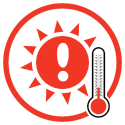SMDHU: Heat Warning and Information System
 Heat Weather Alerts are issued by Environment and Climate Change Canada when temperatures are forecasted to reach heat warning criteria.
Heat Weather Alerts are issued by Environment and Climate Change Canada when temperatures are forecasted to reach heat warning criteria.
There are currently no Heat Warning Alerts issued for communities in Simcoe and Muskoka.
This page is updated Monday to Friday from 8:30 a.m. to 4:30 p.m.
Hot temperatures can be unsafe for our health and wellbeing. It can also harm community services we need, such as healthcare and the energy grid. Heat can affect everyone, but some people are at greater risk than others. Simcoe Muskoka is experiencing a rise in average summer temperatures and more very hot days due to climate change.
The good news is, we can prevent the negative health impacts of heat. To stay safe in hot weather, be aware of the risks and take precautions before heat happens. This will help protect you and your family. Simcoe Muskoka District Health Unit (SMDHU) monitors and shares information on heat-health impacts and offers information on ways to protect yourself from heat. We also work with partners to reduce the risks of heat in our communities.
This page has information on how heat affects health, how to know if you are at risk, and tips to staying safe during hot weather.
If you are experiencing any of the symptoms listed below during a heat event, try to move to a cool place and drink liquids right away. Water is best.
Heat stroke is a medical emergency! If you are caring for someone who has a high body temperature and is either unconscious, confused, or has stopped sweating, call 911 or your local emergency number immediately. |
Heat Health Impacts
Heat can harm health in different ways, including causing illness and death. Heat-related illnesses include dehydration, heat cramps, heat rash, heat edema (swelling of hands and feet), heat exhaustion, and heat stroke. Heat can make existing illnesses like lung and heart conditions worse, which could lead to serious illness or death. In addition, heat can increase risks for pregnant people and newborns. It can also affect mental health, causing mood and behavioural problems, worsening mental illness, and increasing increased aggression, violence, and suicide.
Hot temperatures can change air, water, food quality and safety. Heat can increase rates of some diseases. Heat events stress our vital community services like healthcare and energy systems.
Heat events can happen at the same time or close to other health hazards, such as wildfire smoke events or power outages. Understanding potential risks and creating a plan of action to reduce risks is important.
Who is at risk to the impacts of heat?
Heat affects everyone. However, some people are at higher risk. This is due to differences in people's exposure and sensitivity to heat and their ability to take protective measures.
Prevent Heat Health Impacts
There are things you can do before and during the heat to protect yourself and those you care about.
Extreme Heat Alerts
SMDHU alerts the community of extreme heat events that can be harmful to health. This is part of a province-wide system that uses evidence-based triggers to issue a heat warning or extended heat warning. Heat warnings are issued when:
| Level | Criteria | Duration |
| Heat Warning | Temperatures are expected to be at least 31ºC and overnight temperatures are at least 20ºC
OR
Humidex is at least 40ºC | 2 days |
| Extended Heat Warning | Temperatures are expected to be at least 31ºC and overnight temperatures are at least 20ºC
OR
Humidex is at least 40ºC | 3 or more days |
When a heat warning is issued, SMDHU boosts communication with the public and works with the community to promote actions that protect health. SMDHU monitors heat events Monday to Friday between 8:30 AM and 4:30 PM.
Climate Health Connection
Climate change harms the health and wellbeing of people in Simcoe Muskoka. The average temperature is getting warmer. Extreme heat events (heat waves) are becoming more common, severe, and longer-lasting. This might sound good in the middle of a cold winter, but it harms our health and communities. Climate change can also make cold events worse.
This webpage shares how extreme heat can be dangerous to health. Rising temperatures can also influence health related to air, water and food quality, infectious diseases, extreme weather, and extreme temperatures (including extreme cold events).
In addition to actions that can help keep you safe from the extreme heat highlighted above, other climate mitigation and adaptation actions can help prevent harm from extreme heat and other climate-related problems in the short and long term. Climate action protects and promotes health and wellbeing but can also provide economic savings.
Everyone can take action against climate change. Examples include efforts to conserve energy, reduce consumption, recycle, planting trees. We can also support large-scale changes by staying informed, getting involved, and speaking out.
SMDHU works with our partners to increase community resilience and reduce the adverse health outcomes of climate change and extreme heat. We collaborate with municipal and community partners to inform healthy community design and climate action. We implement heat warning and information systems, conduct surveillance, increase awareness, and encourage protective measures to ensure that our community is safe and prepared for the impact of climate change.
Resources
Information on Weather Forecast and Alerts
Environment and Climate Change Canada:
Most places you get your weather forecast.
Follow SMDHU on Instagram, Facebook, or Twitter to receive communications on extreme heat and other health risks.
Extreme Heat and Health Resources
Health Canada:
Government of Ontario:
Climate Change and Heat: